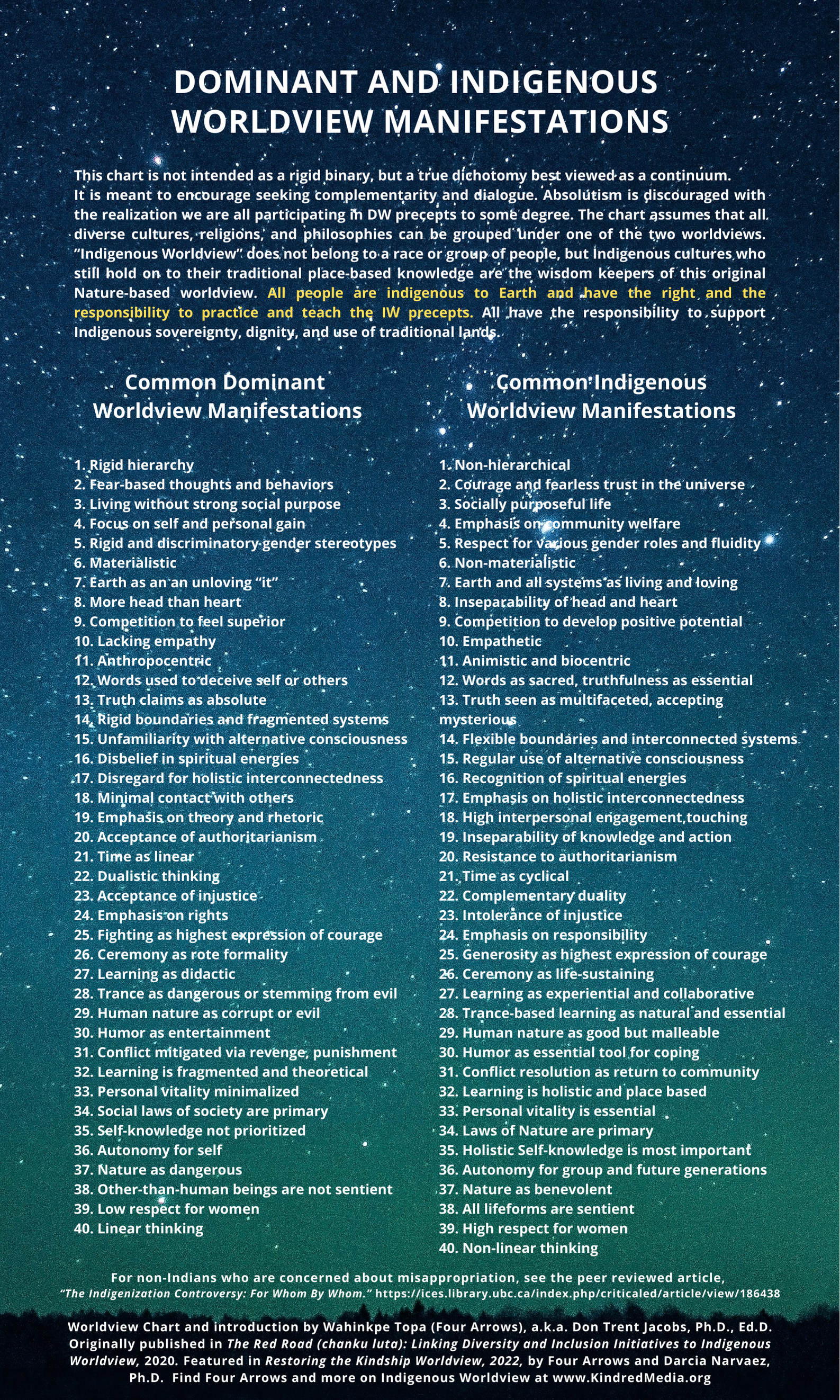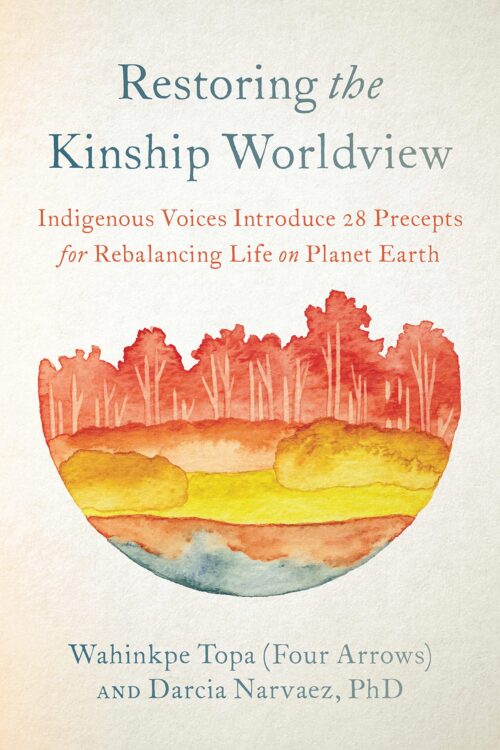Everyone is Indigenous to the Earth, but two other ways matter most today.
KEY POINTS
- Indigeneity involves two characteristics, one general and one specific.
- Specific place-based knowledge of living well in a particular place involved Traditional Ecological Knowledge (TEK).
- First Nation/Aboriginal Peoples share a general worldview we all can learn.
- Embracing the Indigenous Worldview is associated with sustainable/durable lifestyles.
Everyone is Indigenous, native to the Earth, by virtue of birth. Yet at the same time, most people are not Indigenous in the sense of our distant ancestors, and what is common outside of industrialized societies. There are two forms of Indigeneity apparent in traditional First Nation or Aboriginal Peoples. One is a Indigenous worldview or cosmology, apparent in communities worldwide. The other is place-based knowledge which includes traditional ecological knowledge (TEK). TEK is specific to living durably in a particular landscape, so it is unique in each aboriginal group and critical for survival as well as maintaining the flourishing of the ecological communities in which the human group participated.
Indigenous place-based knowledge or TEK is specialized land-based knowledge built over generations from observation and experience passed on from wise elders to the young. In fact, it is this knowledge that has preserved 80% of the planet’s biodiversity that lies in the 20% of land that lies in the hands of First Nation Peoples (Brondizio et al., 2019). TEK is knowledge specific to the locale, whether high desert or low desert, rocky or verdant mountain, savannah or boreal forest. TEK concerns the local native plants and animals, their life courses and needs, the dangers to watch for and how to keep the local ecology resilient. Wisdom sits in places (Basso, 1996).
Four Arrows (aka, Don Trent Jacobs) has been showing readers and listeners how to embrace an Indigenous Worldview in multiple books and videos (Four Arrows, 2006, 2013, 2016a, 2016b, 2020, 2021; Four Arrows & Block, 2011; Four Arrows, Cajete & Lee, 2010; Four Arrows & Narvaez, 2016; Narvaez, Four Arrows et al., 2019). The Indigenous worldview contrasts with the basic assumptions of the dominant worldview (see the contrast here).
In our new book, Restoring the Kinship Worldview: Indigenous voices introduce 28 precepts for rebalancing life on planet Earth,* we dialogue about 28 of the 40 Indigenous Worldview precepts he has identified (see his worldview chart below). We take a quote related to the precept from a First Nation person and then discuss what it means and how to take up the precept. Here are a few of the precepts we discuss:
- Recognition of Spiritual Energies in Nature, with quote from Mourning Dove (Okinagan and Sinixt)
- Emphasis on Community Welfare, with quote from Doña Enriqueta Contreras (Zapotecan)
- High Respect for the Sacred Feminine, with quote from Paula Allen Gunn (Laguna Pueblo)
- Respect for Gender Role Fluidity, with quote from Laura Hall (Haudenosaunee)
- All Earth Entities are Sentient, with quote from Robin Wall Kimmerer (Potowatomi)
- Humor as Essential, with quote from Charlie Hill (Oneida)
- Conflict Resolution as Return to Community, with quote from Wanda D. McCasin (Metiz)
- Laws of Nature as Highest Rules for Living, with quote from Winona LaDuke (Ojibwe)
- Becoming Fully Human, with quote from Greg Cajete (Tewa, Santa Clara Pueblo)
- An Emphasis on Heart Wisdom, with quote from Ilarion Larry Merculieff (Unangan)
Taking up the Indigenous Worldview may be a critical aspect of reversing the destructive pathway we are on. But it is not enough. We need to honor and maintain the longstanding wisdom of First Nation Peoples in caring for local landscapes upon which human life depends.
*All royalties go to supporting Indigenous Peoples.

Download your Worldview Chart poster or graphic below:
Kindred Worldview Chart Starry Night Background in PDF format: Download
Kindred Worldview Chart Starry Night Background in PNG format: Download
Kindred Worldview Chart in black and white for printing in PDF format: Download
Kindred Worldview Chart in black and white for printing in PNG format: Download
More Kindred Articles on Indigenous Worldview and Wisdom
References
Basso, K. (1996). Wisdom Sits in Places: Landscape and Language Among the Western Apache. Albuquerque: University of New Mexico Press.
Brondizio, E.S., Settele, J., Díaz, S., & Ngo, H.T. (Eds.) (2019). Global Assessment Report on Biodiversity and Ecosystem Services of the Intergovernmental Science-Policy Platform on Biodiversity and Ecosystem Services. Bonn, Germany: IPBES. https://ipbes.net/global-assessment
Four Arrows, aka Jacobs, D.T. Ed., (2006) Unlearning the Language of Conquest: Scholars Challenge Anti-Indianism in America. Austin: University of Texas Press
Four Arrows (2013) Teaching truly: A curriculum to Indigenize mainstream education. New York: Peter Lang
Four Arrows (2016a). Point of departure. Charlotte, NC: Information Age Publishing.
Four Arrows (2016b). The CAT-FAWN connection: Using metacognition and indigenous worldview for more effective character education and human survival. Journal of Moral Education, 45, 261-275.
Four Arrows (2020). The Red Road: Connecting Diversity and Inclusions Initiatives to Indigenous Worldview. Charlottesville, N.C.: Information Age Publishing.
Four Arrows (2021). Sitting Bull’s words: Moving backwards into the future. Glen Ellyn, IL: DIO Press.
Four Arrows and Block W. (2011). Differing worldviews: Two scholars argue cooperatively about justice education. Netherlands: Sense Publishers
Four Arrows, Cajete, G., & Lee, J. (2010). Critical neurophilosophy and indigenous wisdom. Rotterdam: Sense Publishers.
Four Arrows, & Narvaez, D. (2016). Reclaiming our indigenous worldview: A more authentic baseline for social/ecological justice work in education. In N. McCrary & W. Ross (Eds.), Working for social justice inside and outside the classroom (pp. 93-112). In series, Social justice across contexts in education (S.J. Miller & L.D. Burns, Eds.). NY: Peter Lang.
Four Arrows, & Narvaez, D. (2022). Restoring the kinship worldview: Indigenous voices introduce 28 precepts for rebalancing life on planet earth. Berkeley: North Atlantic Books.
Narvaez, D., Four Arrows, Halton, E., Collier, B., Enderle, G. (Eds.) (2019). Indigenous Sustainable Wisdom: First Nation Know-how for Global Flourishing. New York: Peter Lang.


